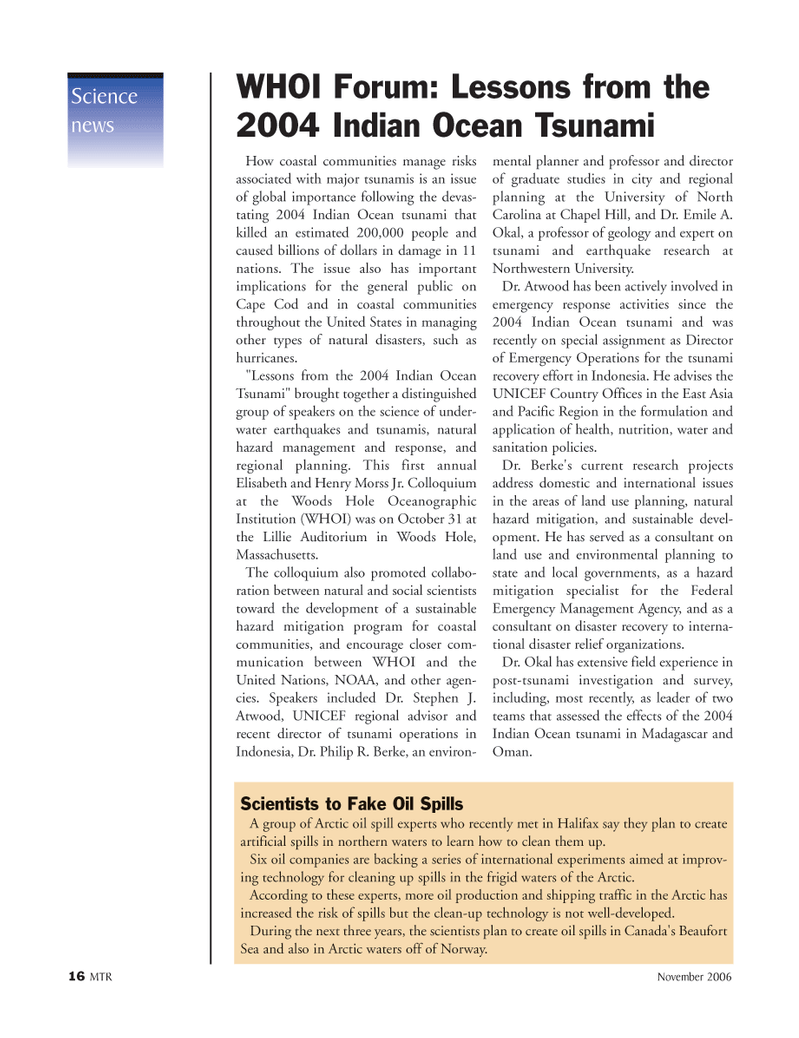
Page 16: of Marine Technology Magazine (November 2006)
Deep Ocean Exploration
Read this page in Pdf, Flash or Html5 edition of November 2006 Marine Technology Magazine
16 MTR November 2006
Science news
How coastal communities manage risks associated with major tsunamis is an issue of global importance following the devas- tating 2004 Indian Ocean tsunami that killed an estimated 200,000 people and caused billions of dollars in damage in 11 nations. The issue also has important implications for the general public on
Cape Cod and in coastal communities throughout the United States in managing other types of natural disasters, such as hurricanes. "Lessons from the 2004 Indian Ocean
Tsunami" brought together a distinguished group of speakers on the science of under- water earthquakes and tsunamis, natural hazard management and response, and regional planning. This first annual
Elisabeth and Henry Morss Jr. Colloquium at the Woods Hole Oceanographic
Institution (WHOI) was on October 31 at the Lillie Auditorium in Woods Hole,
Massachusetts.
The colloquium also promoted collabo- ration between natural and social scientists toward the development of a sustainable hazard mitigation program for coastal communities, and encourage closer com- munication between WHOI and the
United Nations, NOAA, and other agen- cies. Speakers included Dr. Stephen J.
Atwood, UNICEF regional advisor and recent director of tsunami operations in
Indonesia, Dr. Philip R. Berke, an environ- mental planner and professor and director of graduate studies in city and regional planning at the University of North
Carolina at Chapel Hill, and Dr. Emile A.
Okal, a professor of geology and expert on tsunami and earthquake research at
Northwestern University.
Dr. Atwood has been actively involved in emergency response activities since the 2004 Indian Ocean tsunami and was recently on special assignment as Director of Emergency Operations for the tsunami recovery effort in Indonesia. He advises the
UNICEF Country Offices in the East Asia and Pacific Region in the formulation and application of health, nutrition, water and sanitation policies.
Dr. Berke's current research projects address domestic and international issues in the areas of land use planning, natural hazard mitigation, and sustainable devel- opment. He has served as a consultant on land use and environmental planning to state and local governments, as a hazard mitigation specialist for the Federal
Emergency Management Agency, and as a consultant on disaster recovery to interna- tional disaster relief organizations.
Dr. Okal has extensive field experience in post-tsunami investigation and survey, including, most recently, as leader of two teams that assessed the effects of the 2004
Indian Ocean tsunami in Madagascar and
Oman.
WHOI Forum: Lessons from the 2004 Indian Ocean Tsunami
Scientists to Fake Oil Spills
A group of Arctic oil spill experts who recently met in Halifax say they plan to create artificial spills in northern waters to learn how to clean them up.
Six oil companies are backing a series of international experiments aimed at improv- ing technology for cleaning up spills in the frigid waters of the Arctic.
According to these experts, more oil production and shipping traffic in the Arctic has increased the risk of spills but the clean-up technology is not well-developed.
During the next three years, the scientists plan to create oil spills in Canada's Beaufort
Sea and also in Arctic waters off of Norway.
MTR#9 (1-16).qxd 11/14/2006 11:52 AM Page 18

 15
15

 17
17
